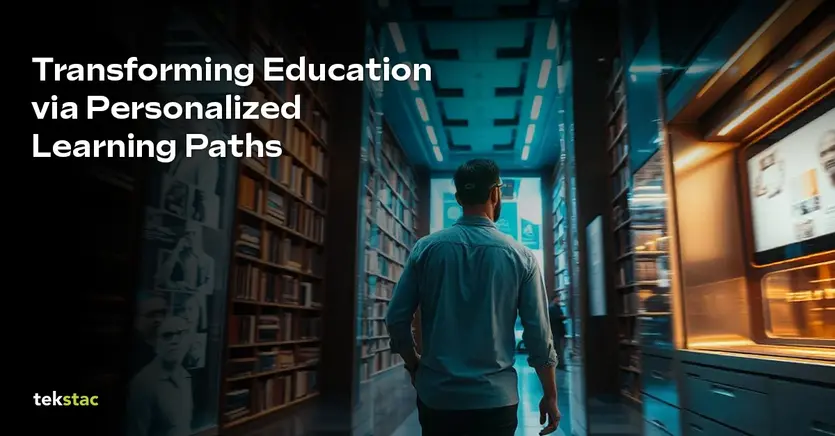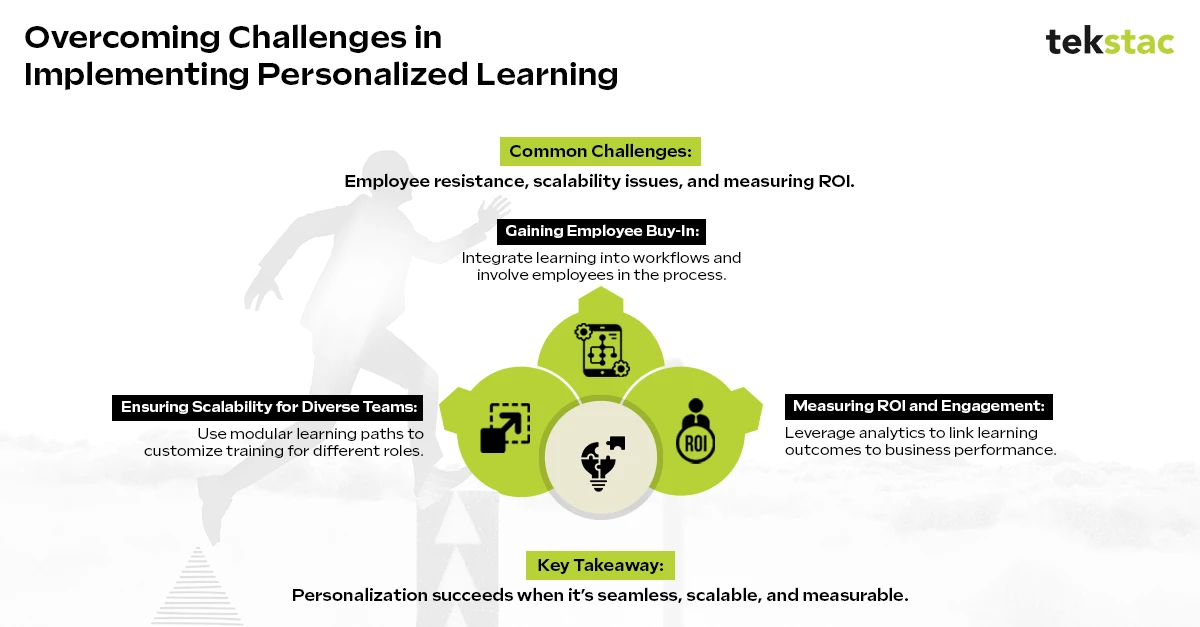Personalized Learning Paths: The Key to Learning Success

Organizations are evolving faster than ever before, driven by technological advancements and shifting business demands. In this dynamic environment, traditional training approaches fall short of addressing employees’ unique needs and aligning with organizational goals.
As the skill gaps continues to widen, LMS adoption is accelerating, with the market projected to reach $57.43 billion by 2030. Businesses turning to AI-powered LMS platforms are seeing strong ROI—streamlined training, higher employee engagement, and noticeable productivity gains are making a real difference.
Step into the future of enterprise learning with personalized learning paths—modern LMS at its finest! These tailored journeys let employees grow at their pace, fueling personal excellence while driving organizational success.
Personalized learning paths are not just a trend—they’re a strategic imperative for businesses determined to stay ahead in a fast-changing world.
Why Personalized Learning Paths Matter to Enterprise Growth
What sets personalized learning apart is its focus on aligning individual growth with business objectives. Unlike conventional training programs, which often take a generalized approach, personalized learning paths are designed to address specific skills gap and career aspirations.
Think of it as crafting a unique development journey for every employee. For instance, a new hire in sales may start with foundational skills like effective communication and gradually move toward mastering advanced negotiation techniques. Similarly, a tech professional could follow a learning path tailored to their expertise, beginning with coding basics and advancing to specialized fields like cybersecurity or AI.
This structured, goal-oriented approach not only boosts employee engagement but also drives measurable results for businesses, ensuring that workforce development directly supports strategic priorities.
How AI and Analytics Drive Personalized Learning at Scale
Modern LMS platforms harness the power of AI and analytics to deliver truly personalized learning experiences. These technologies work by analyzing a range of data points—such as employee roles, past performance, skill levels, and preferences—and using this information to create adaptive learning paths.
Modern enterprise LMS platforms redefine learning through adaptive personalization, a cornerstone of their success.
Personalized Learning Paths That Adapt to Every Skill Level
One of the standout features of AI-powered LMS platforms is adaptivity. By continuously assessing progress, the system adjusts content delivery to match an employee’s current skill level. For example, if a learner struggles with a particular concept, the system might suggest additional resources or simpler explanations to help them overcome the challenge.
Diverse Learning Formats for Greater Engagement
Adaptability is another key component. Employees learn best in different ways—some prefer videos, while others thrive on interactive exercises or written content. Modern systems cater to these preferences by offering diverse formats such as gamification, bite-sized modules, and even immersive VR experiences.
This combination of adaptability and adaptivity not only enhances the learning experience but also ensures employees stay engaged and motivated throughout their development journey.
Overcoming Challenges in Implementing Personalized Learning
While the benefits of personalized learning are undeniable, businesses often face challenges in implementing these systems effectively. Common hurdles include employee resistance, scalability issues, and difficulty in measuring ROI.

1. Gaining Employee Buy-In
For many employees, personalized learning can initially feel like just another task on their to-do list. Resistance often stems from a lack of understanding about how these programs benefit their careers.
To win employees over, businesses must position personalized learning as a tool for growth rather than an obligation. Integrating it into existing workflows—like ongoing skill-building initiatives or project timelines—can make it feel less like a disruption and more like a natural part of their workday. Involving employees in the design process also helps, as they’re more likely to embrace systems that reflect their input and needs.
2. Ensuring Scalability for Diverse Teams
As organizations grow, they often struggle to scale training programs to meet the needs of diverse roles and departments. A rigid system can quickly become outdated or underutilized.
Scalable, modular learning paths are the answer. These systems allow businesses to customize training content based on individual or team requirements. For instance, a consulting firm can create separate pathways for entry-level analysts and senior consultants, ensuring that each group receives relevant training without unnecessary overlap.
3. Measuring ROI and Engagement
Leadership often seeks tangible proof that training investments are yielding results. Without clear metrics, it’s challenging to justify continued investment in personalized learning initiatives.
Advanced analytics tools within LMS platforms can tie learning outcomes to business metrics like productivity, employee satisfaction, and retention. Regular assessments and feedback loops also ensure that training remains aligned with evolving business goals.
The Impact of Learning Pathways on Employee Development
Learning pathways are more than just a roadmap—they’re a strategic enabler for employee growth and organizational success. By breaking down complex learning objectives into manageable steps, these pathways make skill-building more accessible and less intimidating.
For example, a marketing professional might start with general strategies like brand marketing and gradually move on to specialized topics like SEO, social media analytics, or email campaign optimization. This structured approach builds confidence, keeps employees focused, and ensures continuous progress.
From a business perspective, learning pathways lead to better-aligned teams that are equipped to tackle challenges head-on. Employees gain the skills they need to excel in their roles, while companies benefit from a more skilled and motivated workforce.
Designing the Future of Corporate Learning
The future of corporate learning lies in flexibility, accessibility, and data-driven customization. Personalized learning paths integrate seamlessly into this vision, transforming LMS platforms from simple training tools into strategic assets.
Key Features That Drive Success
- Mobile-First Designs: Employees can access training anytime, anywhere, ensuring uninterrupted learning even in a remote or hybrid work environment.
- Gamification and Interactive Elements: Features like leaderboards and challenges keep employees engaged and motivated.
- Intelligent Feedback Mechanisms: Continuous assessments provide actionable insights, allowing businesses to refine their learning strategies.
These features ensure that learning systems remain dynamic and responsive, capable of adapting to changing business priorities and employee needs.
Fueling Business Growth with Personalized Learning Solutions
Personalized learning paths are more than a feature—they’re a transformative approach to employee development. By leveraging the power of AI, advanced analytics, and adaptive technologies, modern enterprise LMS platforms deliver training that’s as dynamic as today’s business environment.
For employees, these systems offer a clear path to growth, building confidence and enhancing job satisfaction. For organizations, they represent a strategic advantage, ensuring that workforce development aligns with business objectives.
Ready to transform your learning strategies? Schedule a demo today and see how personalized learning paths can elevate your workforce to new heights!





